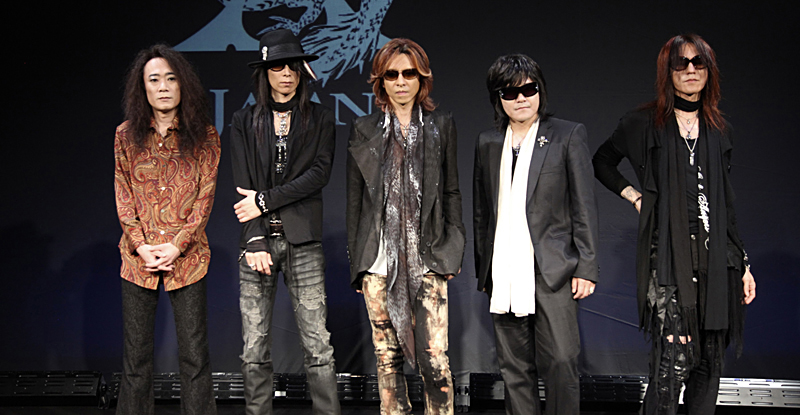Three songsinto X Japan’s sold-out reunion concert at the Tokyo Dome in 1998, co-founder and drummer Yoshiki Hayashi—a man often hailed as the “Bono of Japan”—decided to hurl himself into his drum set in front of 50,000 fans.
“It was so stupid,” he admits in a slight accent over the phone from Los Angeles, his home away from Tokyo. “I had cuts all over my body. The show could’ve ended right there. But 50,000 people screamed, and we kept playing. That’s rock. The audience should feel like something crazy might happen onstage, that anything is possible.”
Prior to X Japan’s inception and the release of their 1989 breakthrough album Blue Blood, the Japanese had never seen anything so extreme: five guys rocking more eyeliner than David Bowie and hair bigger than Diana Ross, playing hot-blooded heavy metal. In a conformist society with a high value placed on modesty and tradition, their flamboyance in the ’80s and ’90s was so shocking that it makes Lady GaGa look like Joan Osborne. And it worked to their advantage. X Japan became one of the first independent acts to achieve mainstream success in Japan, selling more than 30 million records and filling the 50,000-seat Tokyo Dome an astounding 18 times.
Arguably the biggest band America has never heard of, X Japan embarked on their first North American tour this fall, hoping to change that. “Being big in Japan is being big in Japan,” Yoshiki explains matter-of-factly. “We want more. We want to be big in the world. America is an important factor in making that happen.”
But will Americans bite? Rock has taken a back seat to hip-hop and pop acts in this country’s arenas and sales charts. Yoshiki observes that rock is tamer than it used to be, with the theatrics its artists were once known for being utilized more in other genres.
Longtime fan April Zhu (from Shanghai), who studies at South Seattle Community College, claims they are Asia’s answer to Kiss, Metallica, even Led Zeppelin. She purchased her ticket for the band’s concert at the Paramount weeks ago. “The first time I heard X Japan, I was shocked,” Zhu says. “Their music is so special, so inspiring. Listening to how hard they rock gave me the courage to come to school in America.”
When the near-anonymous band took the stage for their first-ever American appearance at this year’s Lollapalooza in Chicago, the initial crowd of a couple thousand nearly quadrupled by the end of their set.
“So many of those people had never heard of X Japan,” Yoshiki recalls. “We were excited, but also really nervous. Their reaction gave us confidence, though. It made us want to try harder to break through.”
That wasn’t always the case. In 1997, when the band first decided to attempt an international crossover, some members, content with local fame, had reservations about starting over. Lead vocalist Toshimitsu “Toshi” Deyama and Yoshiki stopped speaking, and disbanded shortly after. A year later, X Japan’s lead guitarist and most popular member, Hideto Matsumoto—known to his fans as “hide,” in lowercase—committed suicide.
The nation’s youth were overcome with sadness, similar to Seattle’s response to the death of Kurt Cobain. Like Nirvana, X Japan spoke to—and for—a generation that otherwise felt repressed and often alienated. They wept openly in the streets after hide’s death. A museum celebrating his life and music was erected in his honor. Almost as large as the Seattle Art Museum, its several rooms housed statues bearing the musician’s likeness, video installations, and personal possessions like his passport, his black Cadillac, his first Gibson guitar given to him by his grandmother, his outrageous stage outfits, even a comb he used to tease his hair—containing actual strands of his hair. A portrait of hide, visible for miles, hung above the entrance—his hair a shock of fuchsia, his lips twisted into a snarl, his eyes dark, seemingly bottomless pools. The hide Museum was scheduled to operate for three years. It stayed open for five.
Now, of course, the band must start from scratch. The stadiums filled and millions of records sold are in the past. Japanese superstars, like pop princess Utada Hikaru and punk rockers Shonen Knife, have had limited success reaching American audiences. But Yoshiki says X Japan is up for the challenge.
When booking an overseas band, says Adam Zacks, senior director of programming for Seattle Theatre Group, he considers “whether immigration/work visas will be an issue, and our confidence level as to whether we’ll be able to reach the audience.” He says X Japan comes out clear on both counts. “I expect the audience will be largely Japanese, but a lot of non-Japanese J-Culture enthusiasts will be there as well,” Zacks said in an e-mail.
X Japan wants so badly to succeed that they worked with an English pronunciation coach for recent recording sessions. “We aren’t trying to make it perfect, but we at least want people to understand what we’re saying,” Yoshiki says laughingly.
The band’s upcoming album is almost entirely in English, and comprises past hits and new songs: progressive metal anthems featuring awesome vocals, haunting piano passages, and riotous guitar rifts. Their publicist claims it’s scheduled to be released by a major American label in early 2011, but the ink’s not yet dry on the deal.
When X Japan performs at the Paramount Theatre this Friday, it will be a far cry from the venues the band is accustomed to, but Yoshiki views it as an opportunity rather than an obstacle. “It’s back-to-basics rock,” Yoshiki enthuses. “We cannot play at small places in Japan anymore. It gets too crazy. Now we get to experience again what it feels like to really do rock, to work from performing in a small place to a huge stadium!”
Catching himself, Yoshiki clarifies: “That’s assuming X Japan ever gets to play big stadiums in America. We will have to wait and see.”





